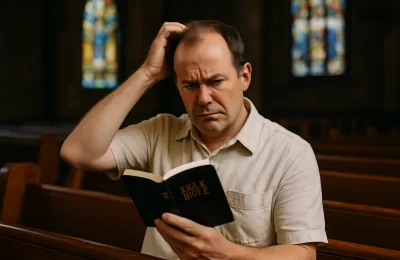Truth Matters, Part 4: A Response to Katherine Maher’s TED Talk
“What is truth?”
—Pontius Pilate, 33 AD
Also: Every college freshman in a 101 philosophy class
Pilate’s question wasn’t a real inquiry. It was a cynical shrug—the ancient world’s version of “Whatever, man.” Standing face to face with incarnate Truth, he punted.
And honestly, our culture isn’t doing much better.
After watching truth get rebranded as personal preference, political weapon, or group therapy session (thanks, Katherine Maher), it’s time to ask: What is truth?
This post turns from critique to construction. Enough of what truth isn’t. Let’s rediscover what Scripture says it is—and why it’s not just propositional, but personal, powerful, and worth dying for.
God Is Truth: The Ontological Foundation
Truth isn’t something God owns like a tool. It’s something He is. Scripture calls Him:
- “The God of truth” (Isaiah 65:16, LSB)
- “Abounding in truth” (Exodus 34:6)
- “He cannot lie” (Hebrews 6:18, LSB)
That’s not theological decoration—it’s ontological reality.
Wayne Grudem puts it like this:
“All His knowledge and words are both true and the final standard of truth.”
(Systematic Theology, 1994, p. 195)
This means truth is absolute, universal, and immutable—not because we voted on it, but because it reflects the character of the One who spoke galaxies into being and hasn’t once revised His position.
Francis Schaeffer nailed it:
“Truth is truth about total reality, not just about religious things.”
(How Should We Then Live?, 1976, p. 22)
God doesn’t dabble in truth. He defines it. He embodies it. And He doesn’t outsource it to the Internet.
Christ Is Truth: The Incarnational Expression
Truth doesn’t just dwell in heaven—it walked among us. Jesus didn’t say, “I point you to the truth.”
He said:
“I am the way, and the truth, and the life.” (John 14:6, LSB)
Jesus is truth—wearing sandals and eating fish. The eternal Logos became flesh (John 1:14), revealing God full of grace and truth. He didn’t balance the two like a tightrope walker. He embodied them perfectly, simultaneously.
When Pilate asked, “What is truth?” he was staring at it. And still chose politics over repentance.
C.S. Lewis minced no words:
“A man who was merely a man and said the sort of things Jesus said would not be a great moral teacher.”
(Mere Christianity, 1952, p. 52)
If Christ is truth, then every worldview, ideology, and TED Talk must answer to Him. He’s not one truth among many. He’s the standard against which all others are measured—and found wanting.
Scripture Is Truth: The Propositional Revelation
Jesus prayed,
“Sanctify them by the truth; Your word is truth.” (John 17:17, LSB)
Not true-ish. Not true for them. Truth. Period.
This isn’t just inspiration. It’s inerrancy, infallibility, and sufficiency. Scripture is not a helpful resource; it’s the final court of appeal.
John MacArthur rightly states:
“Scripture is the bedrock truth against which all claims must be tested.”
(The Truth War, 2007, p. 41)
Lewis Sperry Chafer warned that when theology starts with human speculation, not divine revelation, it builds castles in the sand:
“The Bible alone is the textbook of theology.”
(Systematic Theology, 1948, Vol. 1, p. 10)
Maher’s “minimum viable truth” says: collaborate, then believe. Scripture says: God has spoken—now repent and follow.
The Spirit Is Truth: The Illuminating Witness
Jesus promised that the Holy Spirit—“the Spirit of truth” (John 16:13)—would guide believers into all truth. That doesn’t mean we get new revelations every time we journal. It means the Spirit opens our eyes to what God has already spoken.
Apart from Him, people suppress the truth (Romans 1:18), not because they need more information, but because sin makes truth feel like a threat.
Katherine Maher’s framework assumes that humans, given enough conversation, will eventually land on something wise. Scripture… disagrees.
Paul says:
“The natural person does not accept the things of the Spirit of God… they are spiritually discerned.” (1 Corinthians 2:14)
Truth isn’t discovered through community dialogue. It’s revealed by God and illuminated by the Spirit—or it’s missed entirely.
The Church Is the Pillar of Truth: The Communal Steward
Paul says the church is “the pillar and support of the truth” (1 Timothy 3:15, LSB).
Not its inventor. Not its editor. Its steward.
Wikipedia is editable. The gospel is non-negotiable.
John Frame reminds us:
“Truth is not invented by the church, nor subject to community negotiation. It is something we receive and transmit.”
(The Doctrine of the Knowledge of God, 1987, p. 165)
We are guardians, not curators. The Church doesn’t adapt the truth to stay relevant. It proclaims the unchanging Word in a world allergic to certainty.
The Gospel Is Truth: The Saving Message
Paul calls the gospel “the word of truth” (Ephesians 1:13, LSB). It isn’t just true—it’s life-giving.
Truth doesn’t just inform. It redeems. It’s the megaphone that calls sinners to repentance, offers grace through Christ, and separates eternity into two paths.
Those who “do not receive the love of the truth” face judgment (2 Thessalonians 2:10). Truth is not neutral. It divides. It saves. It sanctifies. And yes, it offends.
Jesus said:
“You will know the truth, and the truth will set you free.” (John 8:32)
That’s more than a bumper sticker. That’s a cosmic jailbreak for anyone still trapped in lies.
Conclusion: Truth to Live (and Die) For
The biblical doctrine of truth is gloriously uncompromising.
- Rooted in God’s character
- Revealed in Christ
- Written in Scripture
- Illuminated by the Spirit
- Stewarded by the Church
- Declared in the Gospel
It doesn’t need to be modernized. It needs to be believed. And it doesn’t shrink when challenged—it shines brighter in the dark.
“The grass withers, the flower fades, but the word of our God stands forever.” (Isaiah 40:8, LSB)
Katherine Maher wants a world held together by “minimum viable truth.”
We need a world anchored in eternal, maximal, unbreakable truth.
Next time, we’ll close the series with a question that matters more than ever: Can we speak the truth without losing our minds—or our hearts?
Coming Up:
Truth in Love: Courage, Clarity, and Compassion in a Post-Truth Age
The finale of Truth Matters will equip believers to speak boldly—but not bitterly—in a world allergic to truth and addicted to affirmation.








